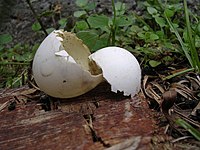
Photo from wikipedia
Eggshell quality is economically important for table eggs and functionally indispensable for hatching eggs. During the formation of eggshell in the uterus, organic matrixes in uterine fluid can control and… Click to show full abstract
Eggshell quality is economically important for table eggs and functionally indispensable for hatching eggs. During the formation of eggshell in the uterus, organic matrixes in uterine fluid can control and modify the formation of calcified eggshell. At present, there are limited studies focusing on the effect of uterine organic metabolites on eggshell quality. In this study, an LC-MS-based metabolomic technology was performed to identify the crucial uterine metabolites that differently presented in hens producing eggs with divergent eggshell quality (eggshell strength, thickness, and weight). More than 1000 metabolites were identified in uterine fluid, and six putative metabolites, including phosphatidylcholine, diacylglycerol, verapamil, risedronate, coproporphyrinogen III, and biliverdin, were screened to play crucial roles in eggshell calcification. Then, two trials for oral administration and in vitro calcite crystal growth were conducted to verify the effect of potential different metabolites on the eggshell quality. Verapamil has a temporary effect on decreasing eggshell strength and eggshell thickness. Coproporphyrinogen III could induce smaller calcite crystals to improve eggshell strength while biliverdin could modify crystal morphology by forming rougher faces and rounder edges to strengthen the eggshell. The present study gives us new insight to understand the role of uterine fluid matrixes in eggshell calcification.
Journal Title: Metabolites
Year Published: 2021
Link to full text (if available)
Share on Social Media: Sign Up to like & get
recommendations!